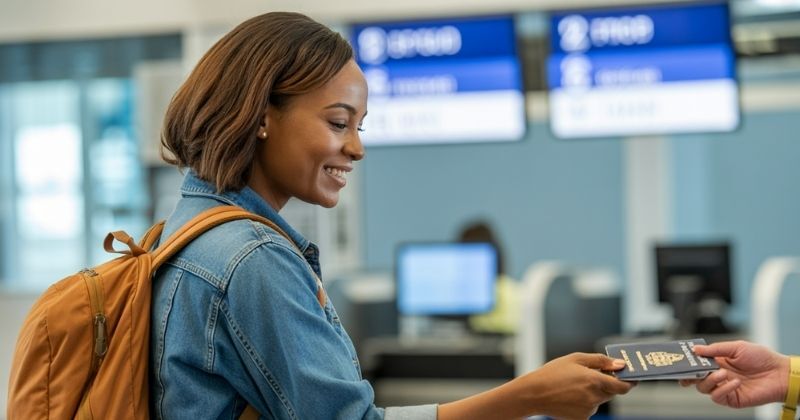
The Department of Home Affairs is undergoing a far-reaching transformation, with officials committed to significantly improving the delivery of core services. For many South Africans, Home Affairs is one of the most frequent points of contact with the state, as it is responsible for crucial documents such as birth certificates, identification documents, passports, and visas. These services are essential not only for establishing legal identity and citizenship but also for ensuring full economic participation within the country.
Key Takeaways
- Home Affairs Reform Under GNU Collaboration: The Department of Home Affairs, led by Minister Leon Schreiber (DA) and Deputy Minister Njabulo Nzuza (ANC), is rolling out major service reforms, showing rare cross-party cooperation to address inefficiencies that have plagued the Department for years.
- Smart ID and Passport Expansion Through Banks: Over 3.5 million Smart IDs were issued in the past year, exceeding targets, while partnerships with leading banks are set to bring passport and Smart ID services to more than 1,000 branches nationwide, eventually linking them to banking apps for faster access.
- Visa and Digitisation Drive: A 10-year visa backlog of 306,000 applications has been cleared, the Trusted Tour Operator Scheme has boosted tourism from India and China, and the upcoming Electronic Travel Authorisation system promises to speed up entry while generating new revenue, supported by a broad digitisation strategy.
About Arcadia Finance
Find the right loan effortlessly through Arcadia Finance. Access 19 reputable NCR-approved lenders with no application costs, while enjoying a quick, secure, and trustworthy way to match your financial needs.
Historically, Home Affairs has been criticised as a leading source of inefficiency within government. Citizens have often found themselves waiting for hours on end, sometimes without receiving assistance at all. In an attempt to correct this perception and improve outcomes, the Department has embraced modern practices and technologies, positioning itself as an example of the type of reforms the Government of National Unity (GNU) aims to achieve.
Observers have noted that if Home Affairs can turn around its reputation, it would mark a symbolic victory for the GNU’s broader reform agenda, since this Department has long been viewed as one of the most problematic in the state apparatus.
The Department is currently led by Minister Leon Schreiber from the Democratic Alliance (DA), alongside Deputy Minister Njabulo Nzuza from the African National Congress (ANC). Despite their opposing political backgrounds and ideologies, the two have committed to working collaboratively to address the long-standing problems within Home Affairs and to deliver tangible improvements for the public. The cooperation between these two leaders is being closely watched, as it provides a rare example of cross-party collaboration in a country where political divisions often dominate headlines.
Leadership and Reform Agenda
Since taking office last year, Minister Schreiber has repeatedly addressed the progress achieved by the Department after years of inefficiency and public frustration. At the latest PSG Think Big webinar, he once again presented the reform agenda, underlining how these initiatives are intended to build the foundations of a capable and reliable state. His message was clear: for South Africa to rebuild public trust in government institutions, Home Affairs must become a model of competence and modernity.
Key priorities include better access to Smart ID and passport services through banking institutions, the simplification of visa procedures for foreign visitors, and a more extensive push towards digitisation. These measures are intended to increase efficiency, reduce corruption risks, and modernise how South Africans and visitors experience the services provided by Home Affairs. Analysts argue that these reforms could also help boost South Africa’s global image by showing that the country is serious about modernising its bureaucratic systems and encouraging tourism and investment.

Smart IDs and Passports
One of the most notable achievements highlighted by Minister Schreiber is the Department’s success in surpassing its Smart ID issuance targets. In the past year, Home Affairs issued 3.5 million Smart IDs, which represents one million more than the original target. This demonstrates a major improvement in service delivery and indicates a strong demand among South Africans for modernised identity documents. Breaking this target not only signals improved efficiency but also underscores the public’s growing confidence in updated systems, something that had been severely eroded in previous years.
The Minister emphasised the continued challenges associated with the old green barcoded ID book, which he pointed out is widely linked to identity fraud and illegal immigration. Around 18 million people in South Africa still use this outdated document, and research has identified it as the most defrauded identification document on the African continent.
The persistence of the green ID book highlights both the scale of the challenge and the urgency of accelerating modernisation, as outdated documents continue to expose South Africans to fraud and criminal exploitation.
In response to this ongoing challenge, Home Affairs has expanded its partnership with banks to allow citizens to access passport and Smart ID services at more than 1,000 branches nationwide. Up until now, a pilot project has been running for nearly a decade but has only reached 30 branches. A major obstacle has been the requirement that Home Affairs staff be seconded to bank branches, which restricted the ability of banks to offer the service independently. However, this is expected to change with the expanded model. This represents one of the most significant public–private partnerships in recent years, with the potential to transform how South Africans interact with essential government services.
Several major banks have already committed to the public–private partnership, including Standard Bank, FNB, Absa, Nedbank, Capitec, African Bank, and Discovery Bank. According to the plans outlined, South Africans will soon be able to visit bank branches in both urban centres and rural communities, interact with automated systems such as digital cameras, and order Smart IDs or passports without the long waiting times traditionally associated with Home Affairs offices.
If rolled out successfully, this initiative could drastically cut waiting times, reduce corruption linked to in-person services, and make document collection as routine as visiting a bank branch.
In addition, further integration is planned with banking applications. The vision is that citizens will be able to log into the same mobile app they use for their financial services and submit requests for a Smart ID or passport. This development is expected to significantly reduce pressure on physical Home Affairs offices and bring identity management closer to the everyday tools used by South Africans. This type of integration could place South Africa among the more digitally advanced nations in terms of government service delivery, bridging the gap between state and citizen in a way that is both innovative and convenient.
Building on the recent wins in Smart ID issuance and passport service accessibility, this new expansion of bank-based application points is another important chapter in South Africa’s identity modernisation. Dive deeper into More Banks Roll Out Smart ID Applications Across South Africa to see how banking infrastructure is now speeding up access and convenience for citizens across the country.

Visa Reforms
Alongside improvements to identification documents, the Department has also made significant strides in clearing a large visa backlog. Over the past year, officials successfully resolved a 10-year backlog of 306,000 visa applications, which had been a source of immense frustration for applicants and a barrier to international engagement. The clearing of this backlog is not just an administrative achievement but also a vital step in rebuilding investor and tourist confidence in South Africa’s systems.
The Department has also welcomed new initiatives aimed at boosting tourism. Through the Trusted Tour Operator Scheme (TTOS), South Africa received 27,000 Indian and Chinese tourists within just five months. The TTOS was specifically designed to make the visa process easier for visitors from these countries, who previously faced the burden of travelling long distances to submit their applications. Under this scheme, registered tour operators assume liability for the tourists they bring into the country, which reduces bureaucratic red tape while simultaneously encouraging economic activity and growth in the tourism sector.
Tourism stakeholders have hailed this as a breakthrough that could help South Africa compete with other popular global destinations, especially given the spending power of travellers from China and India.
Further innovation is expected with the rollout of the Electronic Travel Authorisation (ETA) system. Scheduled to launch within weeks, the ETA will automate the visa process, creating a faster and more reliable entry system for foreign nationals. The Minister expressed confidence that the introduction of the ETA, combined with other reforms, will improve South Africa’s standing as an international travel destination. He further noted that visa fees under the ETA system will provide a revenue stream that contributes to the self-financing of Home Affairs operations. If implemented effectively, the ETA could become a cornerstone of South Africa’s tourism strategy, bringing in much-needed foreign currency and positioning the country as a more accessible destination in the global market.

Digitisation and Technology-Driven Change
A central element of the reform strategy has been a comprehensive move towards digitisation. Minister Schreiber has repeatedly stressed that automation and digital transformation are vital for reducing human bias, discretionary decision-making, and the potential for interference or corruption in administrative processes. Digitisation also offers the potential to build integrated databases that improve national security, reduce identity fraud, and enable faster communication between government departments.
He has stated that digital tools are beginning to deliver results, not only by strengthening security measures and anti-corruption safeguards but also by improving efficiency and reducing waiting times for ordinary citizens. Early evidence suggests that streamlined systems are already beginning to shorten application processing times, making services less frustrating for the public.
The Department is in the process of fundamentally re-engineering the way the state delivers identity and immigration services. By adopting new technologies, Home Affairs is able to reconsider long-standing processes and redesign them in ways that ensure faster service delivery and greater accountability. The reforms are framed as part of a wider vision for rebuilding state capacity and creating a government that can meet the needs of its citizens effectively. If sustained, this technological overhaul could mark a turning point for South Africa’s public service delivery, offering a model that other departments may be encouraged to replicate.
Conclusion
The Department of Home Affairs is positioning itself as a testing ground for broader state reform in South Africa, with measurable progress in Smart IDs, passports, visas, and digital transformation. By clearing long-standing backlogs, introducing bank partnerships, and preparing for innovations such as the Electronic Travel Authorisation, the Department is attempting to shed its reputation for inefficiency and become a model of modern governance. If these reforms maintain momentum, they could not only improve the daily lives of millions of South Africans but also strengthen international confidence in the country’s administrative systems.
Fast, uncomplicated, and trustworthy loan comparisons
At Arcadia Finance, you can compare loan offers from multiple lenders with no obligation and free of charge. Get a clear overview of your options and choose the best deal for you.
Fill out our form today to easily compare interest rates from 19 banks and find the right loan for you.

